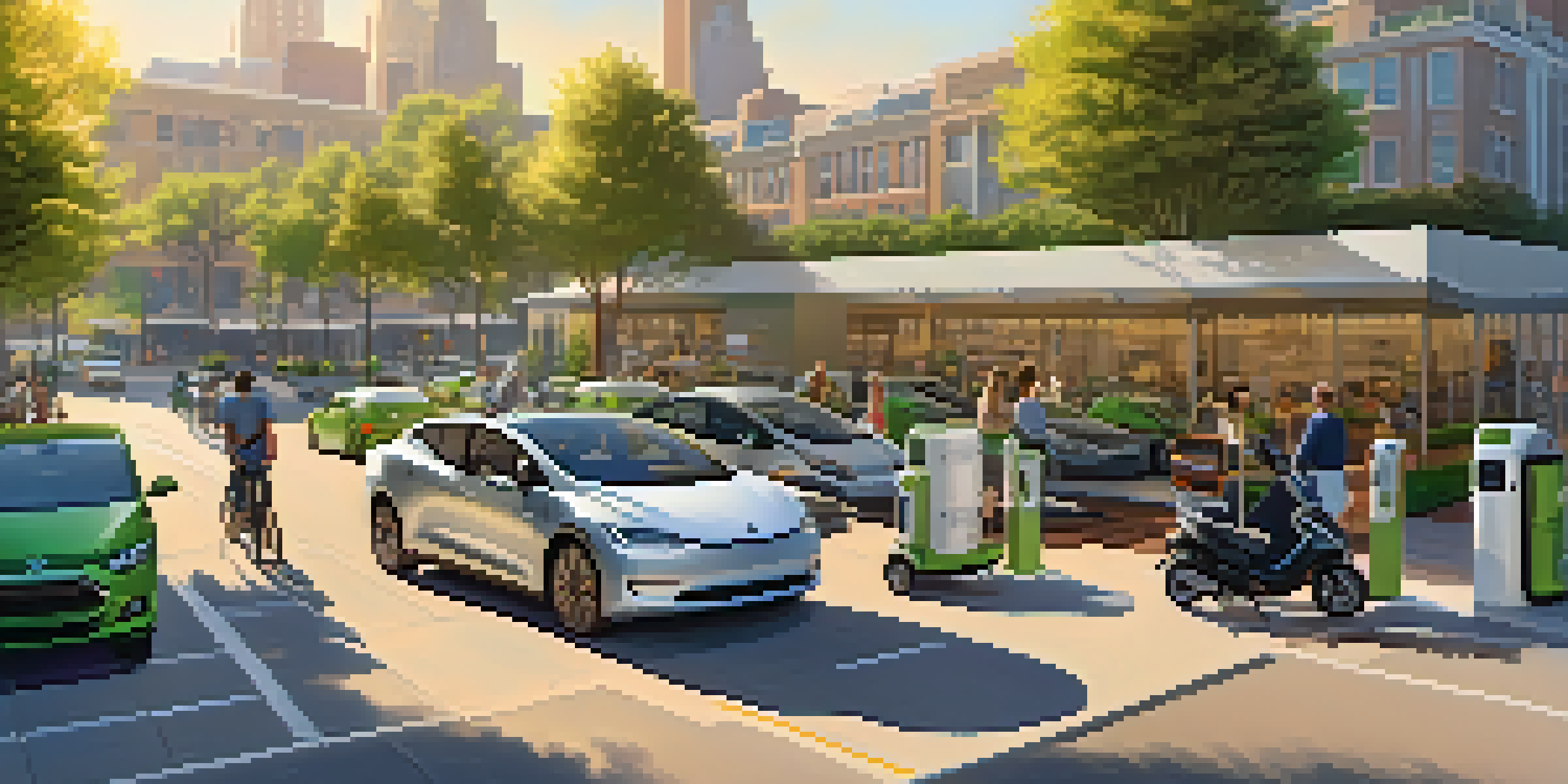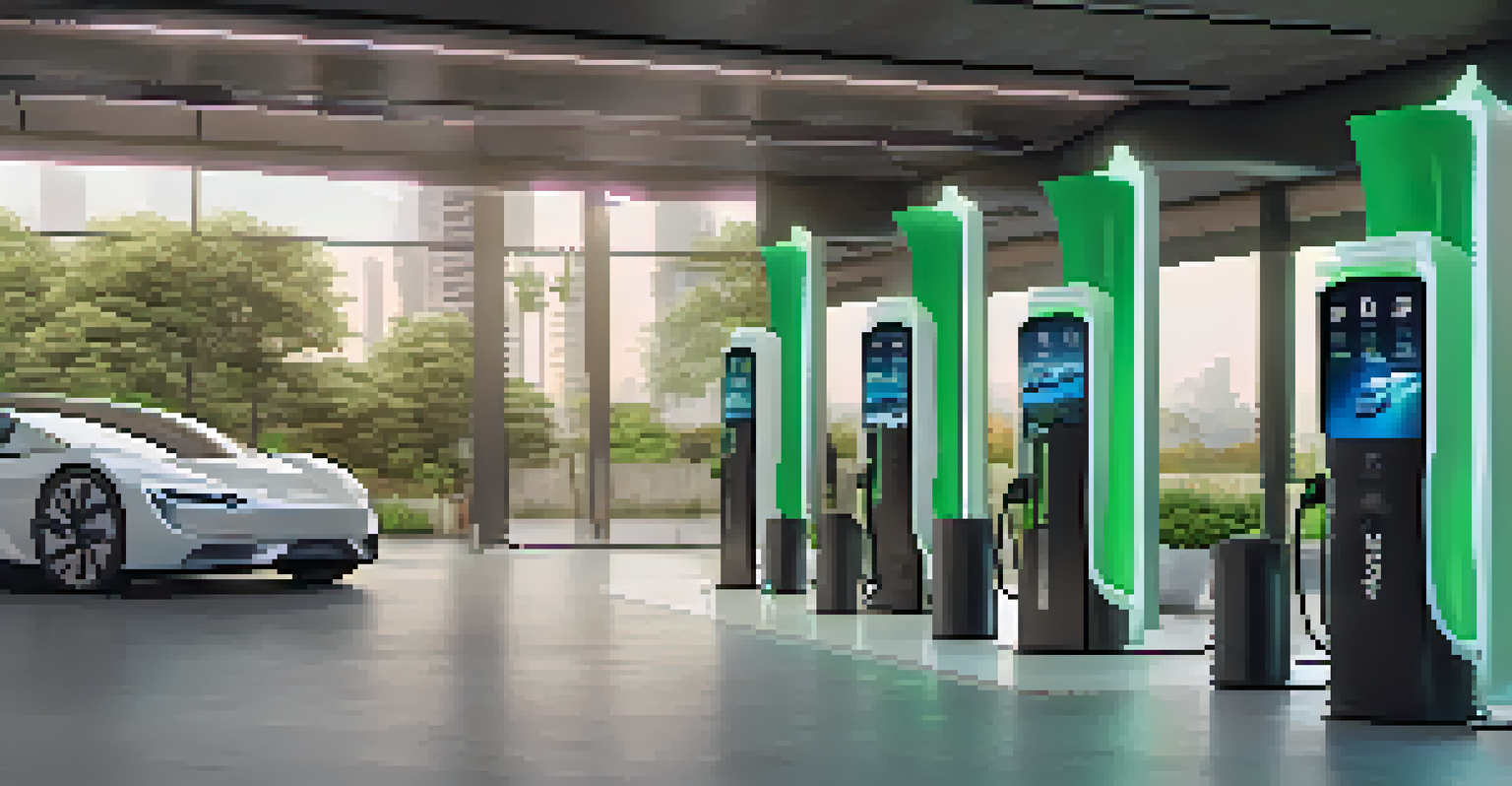Electric Vehicles: A Key Player in Sustainable Transportation

Understanding Electric Vehicles and Their Benefits
Electric vehicles (EVs) are cars powered entirely by electricity, rather than gasoline or diesel. They use rechargeable batteries to store energy, making them a cleaner alternative for personal and public transportation. As we face increasing environmental concerns, EVs play a crucial role in reducing greenhouse gas emissions, which are notorious for contributing to climate change.
The future will be green, or not at all.
One major advantage of EVs is their efficiency. Unlike conventional vehicles, which lose energy as heat during fuel combustion, electric motors convert over 60% of electrical energy from the grid to power at the wheels. This means that drivers can go further on less energy, maximizing both savings and environmental benefits.
Moreover, EVs are becoming more accessible, with various models catering to different budgets and needs. From compact cars to SUVs, the variety of options allows consumers to choose an electric vehicle that fits their lifestyle while contributing to a more sustainable future.
The Environmental Impact of Electric Vehicles
One of the most compelling reasons to embrace electric vehicles is their positive environmental impact. EVs contribute to cleaner air by emitting zero tailpipe emissions, which helps reduce air pollution in urban areas. This is especially important as cities grapple with health issues related to poor air quality, such as asthma and respiratory diseases.

In addition to reducing local pollution, the broader impact of EVs on greenhouse gas emissions is significant. Studies have shown that even when accounting for emissions from electricity generation, EVs typically have a smaller carbon footprint than traditional vehicles over their lifetime. Transitioning to electric vehicles can thus play a vital role in combating climate change.
Electric Vehicles Reduce Emissions
EVs contribute to cleaner air and lower greenhouse gas emissions, making them vital in combating climate change.
Furthermore, as renewable energy sources like wind and solar become more prevalent, the environmental benefits of electric vehicles will only improve. The synergy between EV adoption and the growth of clean energy technologies creates a promising path toward a sustainable transportation future.
Economic Advantages of Electric Vehicles
Electric vehicles not only benefit the planet but also offer economic advantages for consumers. The cost of electricity is generally lower than gasoline, meaning that EV owners can save money on fuel over time. Additionally, many governments offer incentives, such as tax credits and rebates, to encourage the purchase of electric vehicles.
Electric vehicles are not just for the wealthy; they are for everyone.
Maintenance costs for EVs tend to be lower as well. With fewer moving parts and no need for oil changes, electric vehicles require less frequent servicing compared to internal combustion engine vehicles. This translates into savings on maintenance and repair bills, making EV ownership more appealing.
Moreover, as the market for electric vehicles grows, job opportunities in the green technology sector are expanding. From manufacturing to infrastructure development, the transition to electric vehicles is fostering economic growth and innovation in sustainable practices.
The Role of Charging Infrastructure in EV Adoption
A significant factor in the success of electric vehicles is the availability of charging infrastructure. As more drivers consider switching to EVs, the presence of convenient and accessible charging stations becomes crucial. The good news is that charging networks are rapidly expanding, with more public charging stations appearing in urban areas, highways, and even workplaces.
Charging options vary, from standard home chargers that can be installed in garages to fast chargers that can replenish an EV's battery in a matter of minutes. This flexibility in charging solutions makes owning an electric vehicle more feasible for a broader audience, alleviating concerns about range anxiety—the fear of running out of battery power.
Economic Benefits for EV Owners
Electric vehicles offer long-term savings on fuel and maintenance, along with available government incentives.
Additionally, innovative solutions like charging apps help drivers locate nearby charging stations and monitor their charging sessions. This technology not only enhances the convenience of owning an EV but also promotes a culture of sustainable transportation as more people become aware of their options.
Government Policies Supporting Electric Vehicles
Governments around the world are recognizing the importance of electric vehicles in promoting sustainable transportation. Various policies have been enacted to support EV adoption, from financial incentives for buyers to regulations aimed at reducing emissions from traditional vehicles. These measures are designed to accelerate the shift towards greener transportation options.
In several countries, ambitious goals have been set to phase out internal combustion engine vehicles altogether. For instance, some nations aim to ban the sale of new gasoline and diesel cars by 2030 or 2040, which encourages consumers to consider electric alternatives. Such policies signal a commitment to cleaner air and a sustainable future.
Furthermore, investments in research and development are paving the way for advancements in EV technology, such as improved battery life and faster charging capabilities. This support from governments not only fosters innovation but also encourages manufacturers to produce more electric vehicles that meet the growing demand.
Challenges Facing Electric Vehicle Adoption
Despite the many benefits of electric vehicles, there are challenges that need to be addressed to ensure widespread adoption. One significant hurdle is the initial cost of purchasing an EV, which can be higher than that of traditional vehicles. While incentives can help offset these costs, many consumers still perceive electric vehicles as a luxury item.
Range anxiety remains a common concern for prospective buyers. Even with advancements in battery technology, some consumers worry about the distance they can travel on a single charge. This fear can deter individuals from making the switch to electric vehicles, particularly those who frequently undertake long road trips.
Charging Infrastructure is Key
The expansion of charging stations is crucial for alleviating range anxiety and supporting widespread EV adoption.
Additionally, the current charging infrastructure, while expanding, is not yet as robust as gas stations. In rural areas, for instance, charging stations may be sparse, making it challenging for residents to consider an electric vehicle. Addressing these challenges will be essential for maximizing the potential of electric vehicles in the transportation landscape.
The Future of Electric Vehicles in Sustainable Transportation
Looking ahead, the future of electric vehicles in sustainable transportation appears promising. Technological advancements, such as the development of solid-state batteries and improved charging solutions, will likely make EVs more efficient and accessible. As these innovations unfold, we can expect a broader range of electric vehicles to enter the market, catering to diverse needs and preferences.
Public perception is also shifting, with increasing awareness about the environmental benefits of electric vehicles. As more consumers prioritize sustainability in their purchasing decisions, the demand for EVs is likely to rise. This cultural shift, combined with supportive government policies, will create a conducive environment for electric vehicle adoption.

Ultimately, electric vehicles are not just a trend but a key player in the quest for sustainable transportation. By embracing this technology, we can work towards a cleaner, greener future that benefits both people and the planet. The transition to electric vehicles is a journey, and every step taken brings us closer to achieving a sustainable transportation system.